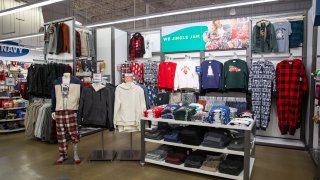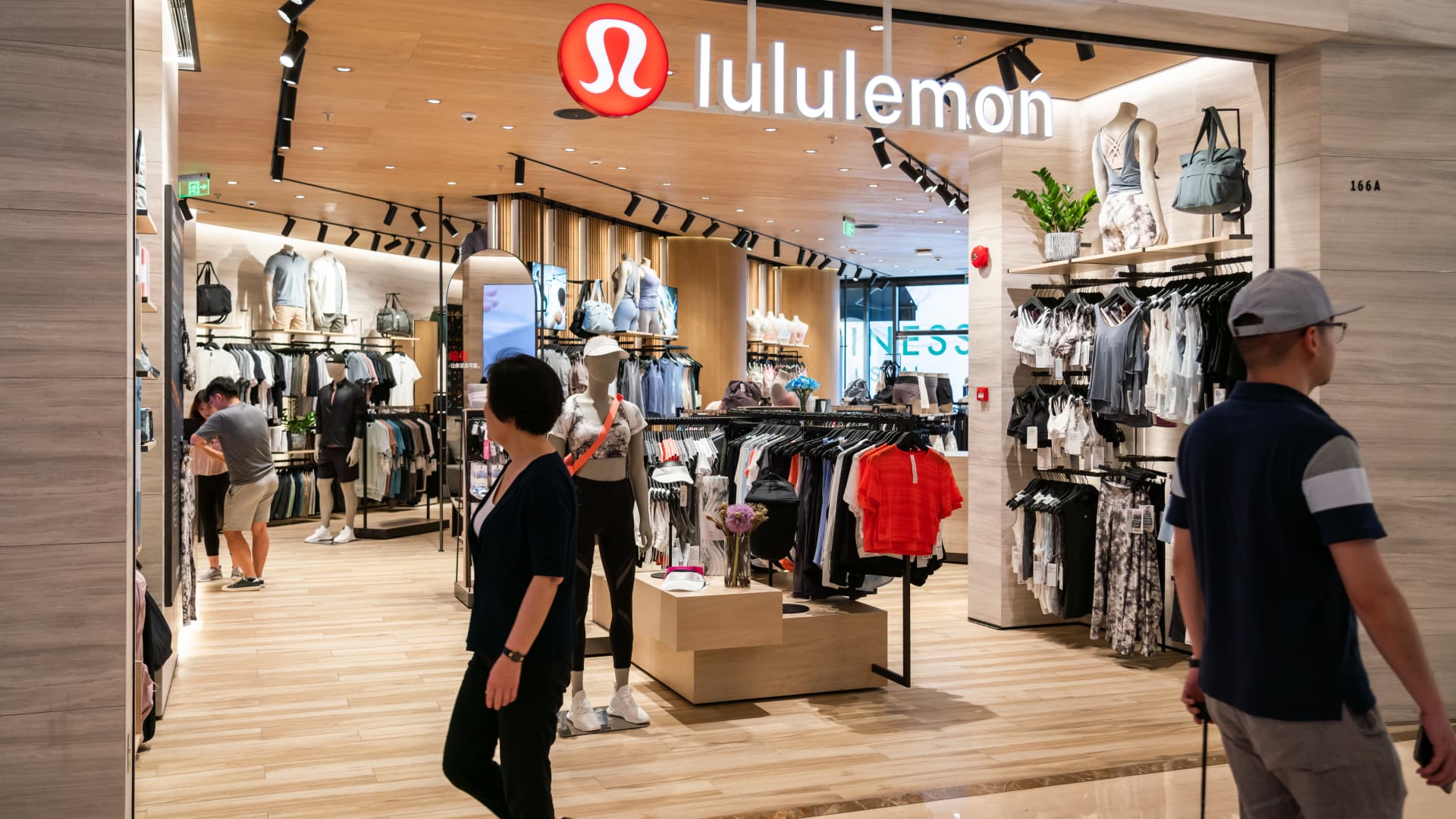
- The athleisure market, fraught with competition, is expected to see sales in the U.S. total $105.1 billion in 2020.
- Items including sweatshirts and sweatpants are expected to account for 31% of total U.S. apparel spending this holiday season, NPD said.
- Dominant players like Lululemon, Gap's Athleta and Nike have reported stronger sales than other apparel retailers during the pandemic.
- While everyone from The North Face to Levi's to Louis Vuitton are vying to get a piece of the pie.
If you walk into any Old Navy store this holiday season, you'll notice a plethora of athletic gear paired with other comfy clothes front and center.
Knowing consumers have been drawn to loungewear like leggings, pajama sets and other cozy options during the coronavirus pandemic, the retailer reshuffled its store layout to accommodate the trend, placing those items right at the door. It also ordered more fleece hoodies, stretchy bottoms, and the like, to make sure its inventories were plentiful ahead of the holiday rush.
"We gave it much more dominant, forward space," Old Navy President and Chief Executive Nancy Green said in an interview. "Active has moved far up in position."
"We believe that the modern way of dressing is mixing things up, so you can pair a power legging for women with a denim jacket ... whether you're working out or hanging out at home," she said. "You'll also see this dominantly in our marketing."
Old Navy said it offered 55% more activewear during the third quarter quarter ended Oct. 31, clearly helping to drive overall sales for the brand, which increased 15%. Meantime, Athleta reported record, quarterly same-store sales gains, driven by a surge in demand for its yoga bottoms, pullover sweaters and sports bras.
Gap, which owns both Old Navy and Athleta, certainly is not the only retailer leaning fully into athleisure — more formally defined as a category of clothing that can be worn for both activities that make you sweat and as casual wear — and reaping the benefits.
Money Report
Dominant players like Lululemon and Nike have reported stronger sales growth than other apparel retailers during the pandemic. And investors have rewarded them for it. Lululemon shares are up 54% since the start of the year, bringing its market value to $46.6 billion. Nike shares are up nearly 34%, with a market cap swelling to $212.8 billion.
Everyone from The North Face to Levi's to Louis Vuitton are vying to get a share of the category, rolling out new products with stretchy fabric that can be worn during a run or a trip to the grocery store. Kohl's is launching its own active apparel brand, called FLX, in early 2021, while Target debuted a new workout label, called All in Motion, earlier this year. There is also a smaller army of direct-to-consumer athleisure brands such as Outdoor Voices and Carbon 38 fighting for dollars.
"Athleisure has changed consumer expectations regarding comfort and fit of their apparel," Coresight Research Founder and CEO Deborah Weinswig said. "We expect the boundaries between athleisure and sportswear and casual wear will continue to blur."

"More and more companies are entering the athleisure category ... attracted by [its] strong growth opportunities," Weinswig added.
The U.S. athleisure market is expected to see sales total $105.1 billion this year, according to an analysis by Euromonitor International and Coresight. This represents a 9.2% year-over-year decrease from 2019 levels due to the pandemic and fewer people shopping in stores. Still, the two firms are predicting sales will rebound next year, projecting growth of 7.9%.
Industry analysts say the forecasted trajectory leaves plenty of room for retailers to run and compete in the space. In fact, they say, brands should get in before it is too late.
Euromonitor and Coresight predict that, through 2023, the athleisure market in the U.S. will grow around 6.5% annually, increasingly taking share from traditional apparel.
'It's a lifestyle'
According to Jennifer Foyle, chief creative officer at the teen apparel retailer American Eagle and global brand president at the company's Aerie division, leggings remain one of Aerie's top-selling categories. In July, it launched a sub-brand called Offline by Aerie, which is focused solely on "soft, cozy and comfortable" activewear, according to its branding.
"This is more than a trend, it's a lifestyle," Foyle said in an interview. "Increased demand for product that our customer can sleep, lounge, work out in, and spend the whole day in has led us to introduce new concepts."
Rival Abercrombie & Fitch has similarly seen success with its Gilly Hicks brand, which competes with Aerie and caters to younger women with its bras and loungewear. Sales at Gilly Hicks were up double-digits during the latest quarter. Online sales grew more than 100% year over year. That was boosted in part by the recent launch of a new active collection, called Gilly Go.
"Soft and cozy is actually in our DNA," Abercrombie CEO Fran Horowitz told CNBC in an interview. "And there's no question that the entire customer mindset has shifted [toward this] this year."
Athleisure wear and so-called cozy items like sherpa hoodies and fleece-lined pants go hand and hand in many consumers' wardrobes. Especially this Christmas.
A 'quest for comfort in uncomfortable times'
Items including sweatshirts, sweatpants, active bottoms, sleepwear and socks are forecasted by the NPD Group to account for 31% of total apparel spending in the United States this holiday season, up from 26% during the fourth quarter of 2019.
"From cozy loungewear, to active glam, and pajama-inspired fashion, consumers will not only be dressing differently, but this frame of mind will also lead them to be more selective with their apparel holiday gifting choices," NPD apparel analyst Maria Rugolo said.
Retailers from L.L.Bean to Kohl's to Urban Outfitters to J.Crew are highlighting comfortable items in their marketing this Christmas. NPD said consumers are on a "quest for comfort in uncomfortable times."
L.L.Bean said sales of its iconic slippers were up 115% for women and 98% for men year over year during September and October, calling those numbers "record breaking." Sales of its women's sweatshirts and sweater fleeces surged 80% and 52%, respectively.
Still, Macy's is at least one retailer betting that its customers are going to be eager to get out of their PJs, once the global health crisis abates.
"A vaccination is obviously on everybody's mind, ... and I think there is going to be a surge of demand when that happens," CEO Jeff Gennette told analysts last week about his expectations for dresses and high-heels, post-pandemic.
People who "have been wearing the same clothes, lounging in active and in casual sportswear ... they're going to want to dress up," he said.






